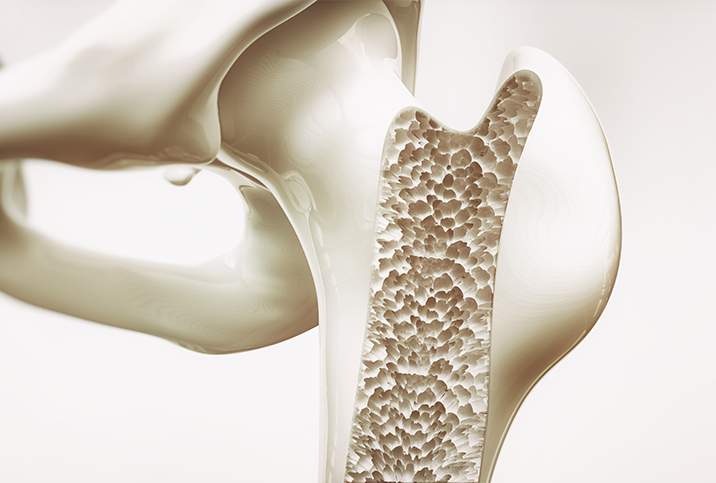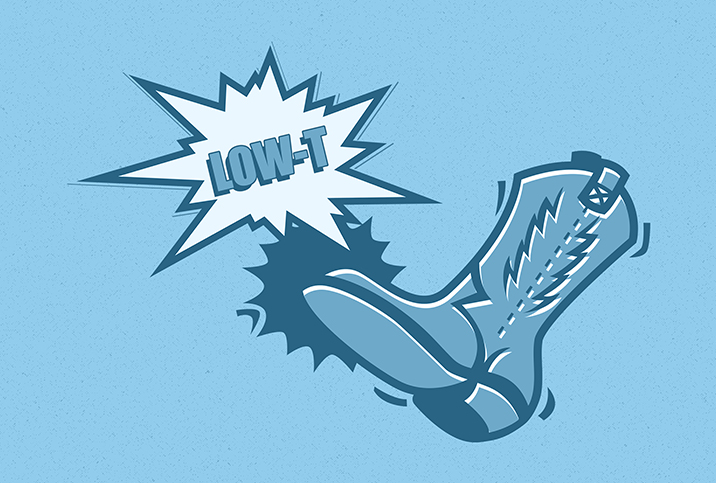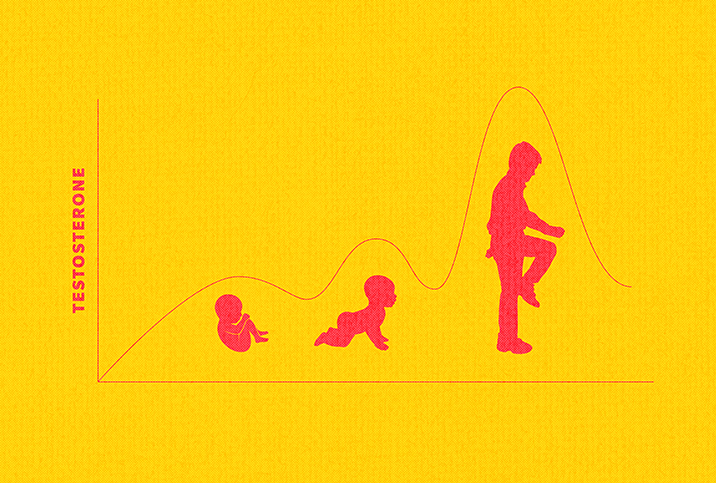9 Potential Causes of Low Testosterone

Testosterone is integral to normal sexual development and function for everyone, though it is most prominent in males. Developed primarily in the testes in men—the adrenal glands produce a small amount, too—testosterone can cause problems if it is deficient. Around the age of 30, men's testosterone levels slowly start to drop. By the time they reach their 60s, 35 percent of men have lower testosterone levels than younger men.
People with low testosterone levels can experience symptoms such as fatigue, reduced lean muscle, irritability, depression, obesity, loss of body hair, low sex drive and erectile dysfunction (ED).
The symptoms associate with low testosterone are most commonly treated by hormone replacement, for which a wide variety of options exist. Unfortunately, many men with conditions such as heart disease, prostate cancer or breast cancer may not be good candidates for testosterone therapy.
For some men, diet, exercise and other lifestyle changes can help alleviate the symptoms of low testosterone. Certain supplements have also shown promise in counteracting low testosterone.
Giddy Health Male Libido vitamins provide natural testosterone support, with clinically-proven ingredients extracted from the eurycoma longifolia plant, as well as zinc, ashwagandha, and D3 to support healthy testosterone levels and boost libido. Created in conjunction with industry leaders and researchers, these capsules utilize microbead technology for a timed release throughout the day, further helping to reduce stress and boost testosterone production.
But what exactly are the causes of low testosterone?
How does testosterone production work?
A hormonal axis centered around the pituitary gland is responsible for testosterone production and regulation.
"The pituitary is a small, roughly pea-sized gland in the brain which secretes stimulatory hormones called gonadotropins. These gonadotropins travel through the systemic circulation to the testicles, and they signal the testicles to produce testosterone, as well as sperm," explained Jeremy Choy, M.D., an endocrinologist and an acting assistant professor of medicine in the department of urology at the University of Washington School of Medicine in Seattle. "The testosterone then circulates back to the pituitary and exerts an inhibitory effect to downregulate the release of gonadotropins. In this way, the body's testosterone levels are maintained within a normal range, similarly to how a thermostat regulates a room's temperature."
Low testosterone (low-T) levels can stem from two conditions: a problem with testicular function (primary hypogonadism) or pituitary function (secondary hypogonadism), Choy said.
The following nine potential causes of low testosterone are tied to either of those two main conditions:
1. Age
The most evident cause of low testosterone is getting older. Testosterone levels decline over time, especially once someone has put their 20s in the rearview mirror. Study findings vary, but men lose somewhere between 0.4 percent and 2 percent of their overall testosterone per year starting at, or shortly after, age 30.
2. Testicular injury or trauma
Underlying testicular issues may prevent testosterone production.
"Any trauma to the testicle can affect the blood supply and tissue integrity of the testicles, leading to low testosterone," said Denise Asafu-Adjei, M.D., a urologist and the medical director of male reproductive medicine at Loyola University Chicago Stritch School of Medicine.
3. Chemo or radiation therapy
Gonadotoxic exposures, such as chemotherapy and radiation therapy, can have similar effects on hormone levels.
After five weeks of radiation therapy, patients experienced a 25 percent reduction in testosterone levels in a European study on radiation therapy-induced hormonal changes in cancer patients.
"Radiation to the testicles, as part of cancer treatment regimens, can destroy testicular tissue and affect testosterone production," Asafu-Adjei said.
4. Genetic conditions
Several genetic conditions can result in low-T due to the underproduction of essential hormones that aid the production of testosterone or the poor receptor response of these hormone signals. Such conditions include Klinefelter syndrome and Kallmann syndrome, according to Asafu-Adjei.
Klinefelter syndrome occurs in men who are born with an abnormal complement of sex chromosomes.
"Instead of one X chromosome and one Y chromosome, Klinefelter patients have two X chromosomes and one Y chromosome," Choy explained.
Kallmann syndrome is a hormonal disorder characterized by the delayed onset or absence of puberty.
5. Congenital conditions
Congenital cryptorchidism—undescended testicles—can cause low testosterone because it affects proper testicular development, and most testosterone is produced in the testicles, Asafu-Adjei noted.
Men can experience congenital causes of secondary hypogonadism as well, Choy pointed out.
"Most of these cases come to medical attention during adolescence in the setting of delayed or absent puberty," he said.
6. Obesity
Obesity can cause the suppression of the gonadal axis, resulting in low testosterone production.
A cohort study with 1,667 participants ages 40 to 70 compiled by the Massachusetts Male Aging Study (MMAS) showed that gaining a significant amount of weight plays a role in the decline of testosterone levels.
7. Medications
Narcotics, glucocorticoids (steroids) and opioids (a group of pain-relieving drugs), including opioid agonists that are used for treating opioid dependence, can lead to low testosterone levels, Choy said.
"Ironically, the most common medication-related culprit is testosterone itself. Many men try to take testosterone or testosterone 'booster' supplements in an effort to enhance their performance, strength, muscularity and virility," he said. "What they may not realize is that taking exogenous testosterone shuts down their gonadal axis entirely by suppressing gonadotropin production, resulting in loss of testicular function; their testicles lose the ability to make testosterone or sperm."
8. Acute illness
When someone is acutely ill, testosterone levels fall because illness suppresses the hormone's production.
"Testosterone levels are expectedly low in this setting and should normalize following recovery from the illness," Choy concluded, offering a bit of good news.
9. Pituitary issues
Pituitary adenoma, a benign tumor within the pituitary gland, can interrupt gonadotropin production.
"The hormones responsible for testosterone production are made in the pituitary gland in your brain. Any tumor or infiltrative process into this gland can affect testosterone production," Asafu-Adjei explained.
Other hormonal abnormalities can also interfere with the gonadal axis, including substantially elevated levels of prolactin (hyperprolactinemia), according to Choy.
However, recognizing the causes of low testosterone production is crucial before jumping to any treatment, because some causes are reversible, Choy said.
"A clear understanding of the underlying drivers behind the low testosterone can inform treatment options and prognostic outlook," he concluded.


















